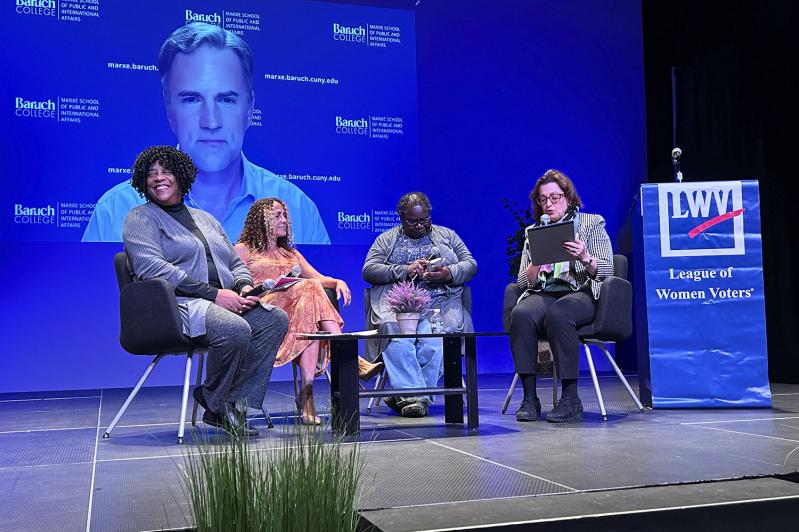Artificial intelligence and deep-fake internet content have become huge talking points in this year’s race to the White House, and the League of Women Voters of the Hamptons, Shelter Island, and the North Fork is doing its part to counter them.
On Tuesday at LTV Studios in Wainscott, the organization hosted a forum titled “How to Confront Misinformation and Build Trust in the 2024 Election,” featuring panelists and speakers addressing the identification and correcting of erroneous discourse, and why it’s important to do so.
The lead panelist, Andrea Gabor, the local league chapter’s government committee co-chairwoman and a professor of business journalism at Baruch College, described disinformation as the “deliberate spreading of lies or untruths,” while misinformation is “the inadvertent spread of lies.”
The uptick in these types of discourse has largely been attributed to the rise of social media as well as technology that allows people to create fabricated images and videos, known as deep fakes, that often spread quickly across the internet and yield the potential to erupt into real-life consequences.
“There is violence connected to all of it,” said Minerva Perez, executive director of Órganizacion Latino Americana of Eastern Long Island, one of the speakers. “That misinformation and disinformation and fear doesn’t just land itself and stay around the internet in a mean and ugly way — it turns into literal violence that kills people.”
The discrimination and hatred faced by the transgender community is one example of the consequences.
“I’m a young trans woman, and in this country, I believe my community is very much on the ballot this year regarding our rights and our livelihoods,” Jackie Iulo of Sag Harbor said during the public comment portion of the forum. Because of lies being spread about trans people, disinformation “is making people see us as trans first and human second.”
“Too often,” said Sonia Jarvis, a panelist who lectures at the Marxe School of Public and International Affairs at Baruch College, “we’re allowing that type of disinformation to discourage people from participating, and there is a purpose behind it.”
Together with a colleague and panelist, Don Waisanen, Ms. Gabor taught a class at Baruch called News Media, Toxic Sludge, and the Future of Democracy. “That’s really where the idea for this panel kind of percolated in my head,” Ms. Gabor said.
Mr. Waisanen described “classical propaganda playbooks” that encourage overstatements “about how fearful or outraged we should be.”
“Anytime someone tells you to be outraged or fearful, that is the moment to put on your critical-thinking hat. The moment anyone says you should feel this way and especially be angry, these are emotions that have been manipulated and continue to be so in our election discourse and our media.”
The conversation ran between discussions of A.I. and deep fakes, legislation such as the Telecommunications Act of 1996, which was meant to encourage competition among news outlets, and the Supreme Court’s 2010 Citizens United ruling, which ended century-old campaign finance limits. These factors, the League of Women Voters panelists agreed, have helped keep social media largely unregulated and encouraged massive campaign spending from corporations in elections.
“We have to encourage citizens to demand more in terms of how . . . these social media outlets [are] being regulated,” Ms. Jarvis said. “Are they hurting our children? That’s a place to start. One of the few areas where we see bipartisan support is, ‘Let’s protect the children from what they are seeing on social media.’ ”
The presenters projected a “cheat sheet” on the wall at LTV displaying resources for fact-checking and fostering news and media literacy. Ms. Jarvis encouraged people to check out the News Literacy Project, a nonpartisan educational group established in 2008. It is “trying to encourage young people, those still in school, to understand before they graduate why it’s important to know the facts as opposed to misinformation or disinformation that they’re hearing,” she said.
Another speaker, Bonnie Michelle Cannon, the executive director of the Bridgehampton Child Care and Recreational Center, echoed Mr. Waisanen’s earlier sentiments, encouraging voters to slow down their intake of information and think critically.
“You have to not take the first word,” she said. “You have to stop and slow down — you have to read, you have to research.”




